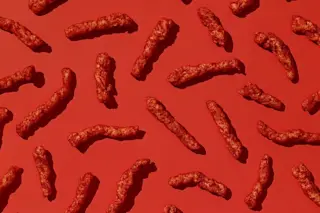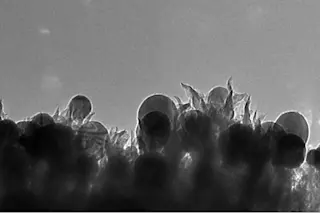Lee Cadesky is the co-founder and COO of both C-fu Foods and One Hop Kitchen. Cadesky earned an M.S. in Food Engineering at Cornell University and later served as a lecturer for the university post-graduation. In 2015 he co-founded C-fu Foods where he leads research and development on "C-fu," a tofu-like protein made out of insects. Cadesky has also been recognized for scientific achievement by the Institute of Food Technologists, the American Association of Candy Technologists, and the American Dairy Science Association.

What hooked you on cooking? I was always into science & engineering. I played with Lego a lot as a kid so from there, becoming an engineer seemed inevitable. What really got me into cooking was reading On Food and Cooking by Harold McGee. It’s a very accessible survey of food science and it opened my eyes to a whole world of food and chemistry that was really easy to play around with—everything you needed was in the pantry. Sous vide cooking was another technology that I really loved and got me into the deep end of food science and technology. It’s been a crazy ride since. The coolest example of science in your food? The best I can think of right now. Junior Mints are hard candies when their first produced but there’s an enzyme added to the filling that softens it in storage so it’s creamy when it reaches the consumer. This enables them to coat the product with chocolate but have that creamy texture too. It’s a cool use of food science to create new food experiences. The food you find most fascinating? Cheese is pretty amazing when you get down to the chemistry of it. Milk proteins are a fascinating biological mechanism to deliver nutrition to a nursing calf. Cheesemaking is basically biological hacking to exploit some of this nutrient delivery mechanism and turn it into a wide range of foods. What scientific concept—food related or otherwise—do you find most fascinating? This may be an odd answer but the Pi-Buckingham theorem is sort of amazing. It’s commonly taught in fluid dynamics classes and explains how you can create scaled models of processes to study them at a small scale and then translate results to a larger one. It’s an incredible idea and it’s what enables lab and pilot scale testing before scaling up to full production. Your best example of a food that is better because of science? I’ll be a little shameless here and say bugs. We’re doing some really amazing work with C-fu Foods to create new insect based ingredients and showcase the incredible flavour, nutrition, and environmental benefits insects can offer. Using food science we created the textured cricket and mealworm proteins that are in our One Hop Kitchen sauces. This helps us take the ick out of insects but keep quality nutrition and great taste. We love comparing the gluten in bread to a network of springs. Are there any analogies you like to use to explain difficult or counter-intuitive food science concepts? There’s lots of food science analogies. Personally, I like to describe proteins as long wiggly strings of oddly sized pearls and do a short dance for visual effect. How does your scientific knowledge or training impact the way you cook? Do you conduct science experiments in the kitchen? Absolutely. I see a lot more structure in my food than I used to. I spent a lot of time studying how food on a molecular level builds textures and I see a lot more texture in my food. I also have access to some fun food/lab tools and ingredients so I play around a lot. One kitchen tool you could not live without? Probably a good knife. Five things most likely to be found in your fridge? Mustard, mayo, miso, kimchi, and these days a lot of textured cricket protein samples Your all-time favorite ingredient? Favorite cookbook? Favorite food ingredient: maybe the Bragg Liquid Aminos. They’re more savory than soy sauce and good with everything. Favorite cookbook: not really a cookbook per se but Modernist Cuisine is beautiful. The recipes are sort of impossible but the pictures are beautiful. Your standard breakfast? Pot of English tea with milk, toast, maybe an egg.








